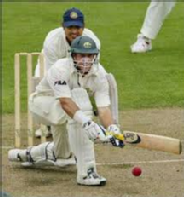Assessing the feasibility and impact of health promotion and screening through sport
Since its origins in the late 1590s, the sport of cricket has become a global obsession for people across the world. In parts of south Asia, it is almost a religion with some players being considered as living gods. With attendances at the major cricketing venues in the UK exceeding over 23,000, the opportunity to deliver health-checks during matches was particularly attractive when compared to other sports such as football and rugby.
An important reason for this is that, in the long form of the game ie a test match, a cricket match can last up to five days. This is particularly conducive for fans, who can step away from the action to have a quick health MOT without missing much gameplay. This sadly would be considered too long for a football fan to be away from the action. Secondly cricket still attracts a diverse age as well as a strong ethnic variation, which is infrequently seen in football.
Conditions such as diabetes, hypertension, cardiovascular disease, obesity, mouth cancer and dementia have become major public health problems in the UK. Data from Public Health England show that this is a particular problem in some black and minority ethnic groups and especially men in their forties. The uptake of preventative screenings and health-checks for some of the conditions highlighted above is poor in many of these communities. Although the Indian, Pakistani, Sri Lankan and Bangladeshi communities are under-represented in football, their attendance at cricket matches is extremely high. Boundaries For Life (BFL) teamed up with the stadium managers of these grounds to make these health-checks an integral part of the services, which fans could experience free of charge on match days. The checks included:
- Cholesterol
- Blood pressure
- Diabetes
- Dental (mouth cancer)
- Body mass index (for obesity)
- and specialist dementia advice was offered
The health-checks were offered in confidence, free of charge, with each participant signposted to see their general medical or dental practitioner for follow-up. For the period 2010-2014, we screened in excess of 500 participants and identified a significant number who had raised parameters or abnormal findings.
Our team of volunteers, which comprised doctors, dentists, nurses, lay members and medical students, shared a common vision which was to offer free health-checks in a relaxed and informal environment using cricket as a model. Over the years BFL has worked with other large health charities, such as the European Healthy Stadia Network and the English Cricket Board (ECB), and has received media attention through the BBC website. Last season Mike Gatting, ex-England cricket captain, was the designated patron for the initiative. A University of Warwick Institute of Advanced Study incubation award facilitated the analysis and evaluation of last year’s activity.

Data from the 2014 season demonstrated high levels of high blood pressure, cholesterol and obesity, not just amongst the fans but also the stadia staff, which has prompted the grounds to look at health-related staff initiatives. The evaluation of the feedback from the participants was extremely positive with all users scoring the health-checks as excellent or very good. The application of the friends and family test has been a frequently used measure of quality whereby users were asked if they would recommend the service to their friends and family. Two hundred and twenty-eight users (100 per cent) stated they would recommend the service. A number of the users have expressed an interest in volunteering for future events.
This information allowed Dr Chetan Trivedy, as the lead, not only to evaluate the feedback from participants, over 228 in total, but also to strengthen the network of participating grounds (done through an expert workshop held in the members lounge at Lords, the most famous of cricketing locations in the world). A group of clinicians, lay members and representatives from six major county clubs discussed how the initiative could be developed further and integrated into grassroots cricket. The vision of hosting a health-check at every county game in the UK at least once a year by 2020 (20-20 Vision) was also born as a future campaign. The public engagement grew from a single clinician who self-funded health-checks to an initiative which developed its own website and brought governing bodies such as the ECB together with leading academics at Warwick Medical School, healthcare professionals and charities. We are in the process of creating a short public engagement film which will be used to promote the initiative.
Plans are in place to expand the health-checks across the UK and even globally, especially in low- and middle- income countries where access to healthcare is poor and the burden of preventable, chronic disease is high. Providing low-cost health-checks through cricket may be a cost-effective method of delivering health prevention.
The research team was:
Dr Chetan Trivedy (Principal Investigator)
Dr Edward Lynch

